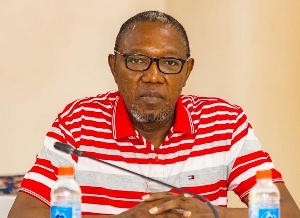- Home - News
- TWI News | TV
- Polls
- Year In Review
- News Archive
- Crime & Punishment
- Politics
- Regional
- Editorial
- Health
- Ghanaians Abroad
- Tabloid
- Africa
- Religion
- Election 2020
- Coronavirus
- News Videos | TV
- Photo Archives
- News Headlines
- Press Release
Editorial News of Thursday, 16 November 2023
Source: ghanaiantimes.com.gh
Editorial by Ghanaian Times: Need to intensify diabetes campaign
Ghana on Wednesday, joined the world to mark World Diabetes Day (WDD), which was created in 1991 by the International Diabetic Federation (IDF) and the World Health Organisation in response to growing concerns about the escalating health threat posed by diabetes.
World Diabetes Day became an official United Nations Day in 2006 with the passage of United Nations Resolution 61/225 and marked every year on November 14, which is the birthday of Sir Frederick Banting, who co-discovered insulin along with Charles Best in 1922.
The global campaign draws attention to issues of paramount importance to the diabetes world and keeps diabetes firmly in the public and political spotlight.
It is estimated that one in 10 adults worldwide have diabetes. Over 90 percent have Type 2 diabetes. Close to half are not yet diagnosed. In many cases, Type 2 diabetes and its complications can be delayed or prevented by adopting and maintaining healthy habits.
In Ghana, approximately 7.5 percent of the adult population is said to have Type 2 diabetes with fears that a lot more people may have the condition but are unaware of it.
According to the Ghana Health Service (GHS), an average of 200,000 cases of diabetes is recorded in Ghana annually with about 10 percent of the population estimated to live with the disease.
In order to draw attention to these alarming figures across the world, World Diabetes Day kept its campaign focused on diabetes as a critical global health issue.
Similarly in Ghana, the GHS has been engaged in activities to draw attention to the disease that has become a public health issue.
One of such activity is the launch of a national guideline for the management of diabetes, which remains a leading cause of death in the country.
The guideline, which is the first of its kind, is to bridge gaps in diabetes management and ensure standardisation while improving clinical and public knowledge of the disease to reduce its prevalence, complications, and associated deaths.
Launching the guideline to coincide with World Diabetes Day yesterday, the Health Minister, Kwaku Agyeman-Manu, said the development of the guideline was significant to reduce diabetes prevalence and improve healthcare for all.
“This document represents a major pillar in the implementation of NCD strategy specifically addressing the burden of diabetes in Ghana and the achievement of the Universal Health coverage 2030 agenda.
The national diabetes guidelines will serve as a roadmap for healthcare professionals, outlining best practices and evidence-based approaches to the management of diabetes and it is expected to not only improve the quality of care but also empower patients to take control of their health and lead fulfilling lives,” he indicated.
The Ghanaian Times commends the Ministry of Health and the GHS for their commitment in seeking innovative ways to reduce exposure to risk factors that contribute to diabetes and the non-communicable disease (NCDs) burden in the country.
What is important now is for the citizenry to embrace the campaign and collaborate with health officials to ensure that the real impact of these guidelines would be felt in communities and healthcare facilities, where individuals living with diabetes and those at risk will benefit from the best practices outlined in the guidelines.
We are all aware of the implications of diabetes on social and national development and cannot pretend that the country is being affected negatively.
We, therefore, entreat the public to adopt healthy lifestyles to improve their health and reduce vulnerabilities to diabetes
Entertainment










